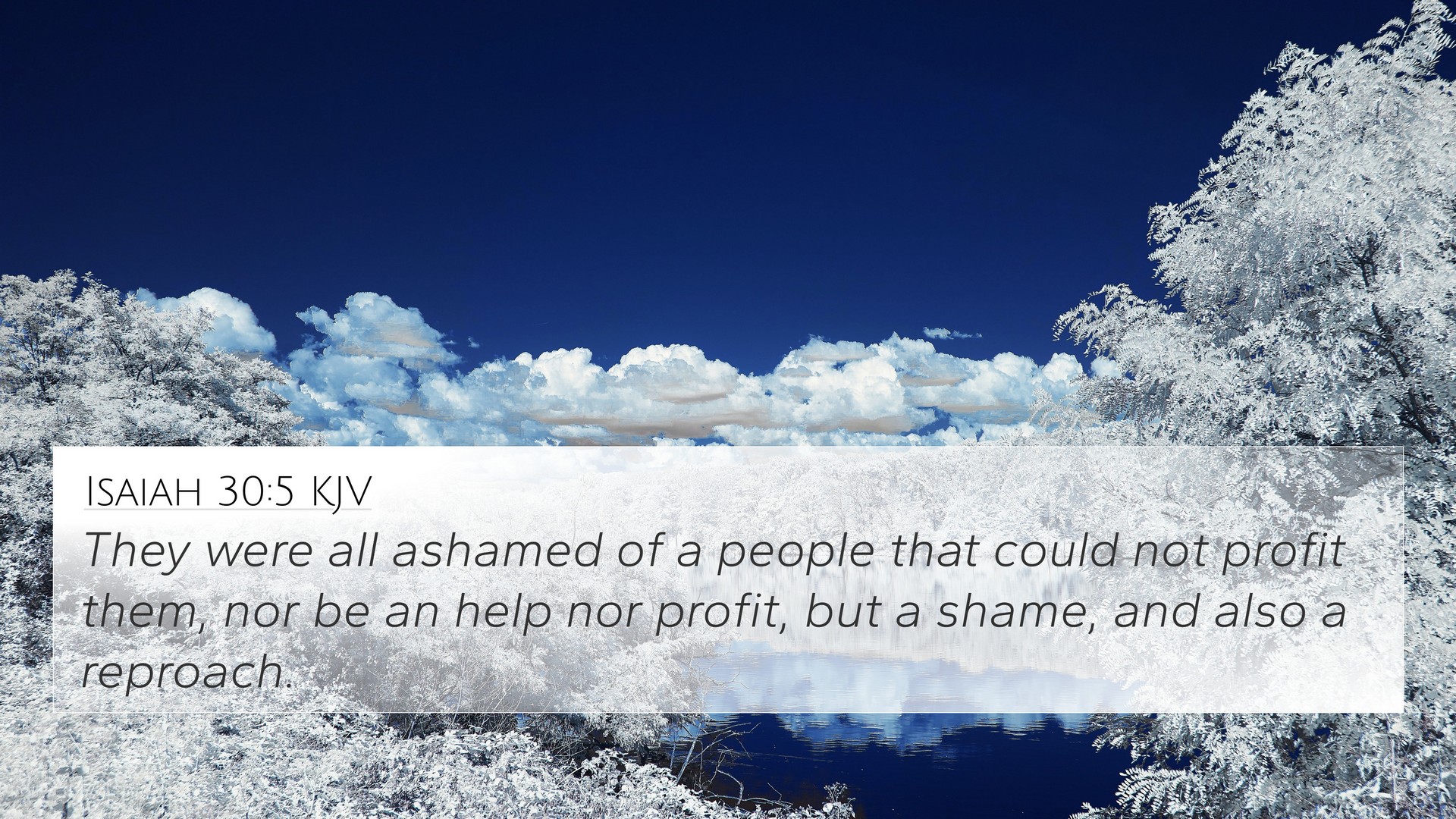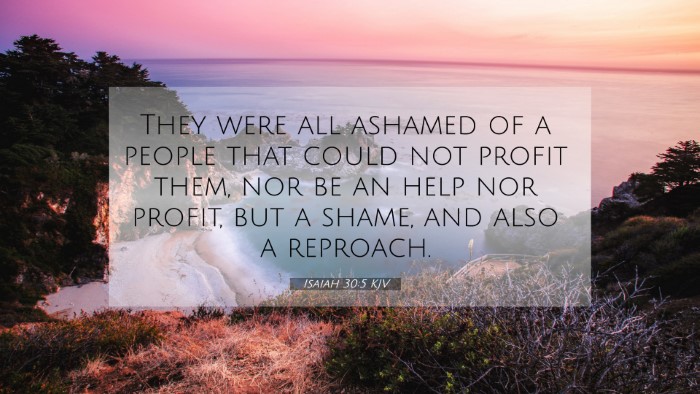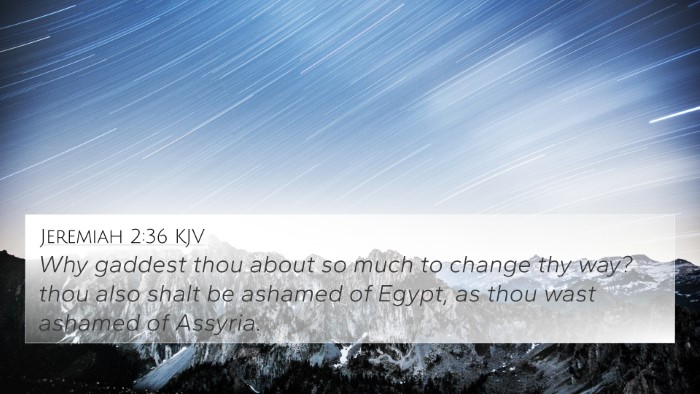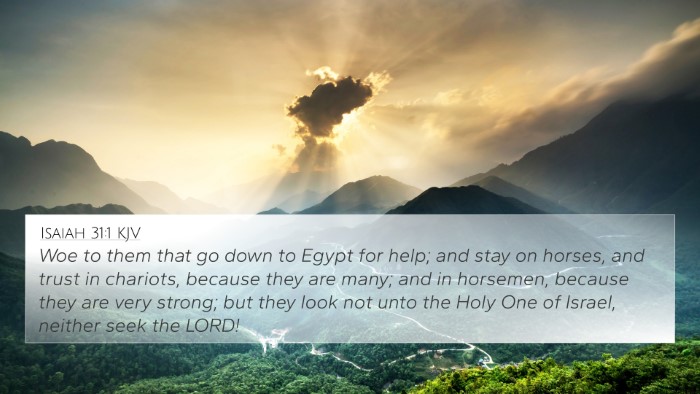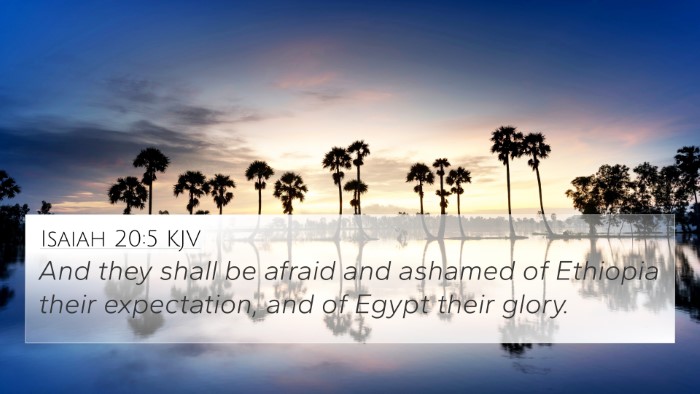Understanding Isaiah 30:5
Isaiah 30:5 states:
"They were all ashamed of a people that could not profit them, nor be a help nor profit, but a shame, and also a reproach."
This verse appears in a context where the Prophet Isaiah is addressing Judah's reliance on Egypt, highlighting the futility of seeking help from a nation that can offer no salvation. The commentary from renowned biblical scholars such as Matthew Henry, Albert Barnes, and Adam Clarke sheds light on the meaning behind this poignant verse.
Isaiah 30:5 - Summary of Insights
- Dependence on Worldly Powers: Matthew Henry emphasizes that the people of Judah sought aid from Egypt, reflecting a lack of trust in God's protection. Their alliance with Egypt is seen as a spiritual reproach that ultimately leads to shame.
- Nullity of False Help: Albert Barnes discusses how the alliance with a powerful nation brings no true benefit. When they find themselves in trouble, they realize that Egypt, despite its might, cannot deliver them from God's judgment.
- Consequence of Rejection: Adam Clarke notes that the shame described in this verse signifies the consequences of turning away from God. In their search for human solutions, Judah finds disgrace as the Egyptians fail them.
- Prophetical Context: All three commentators observe that Isaiah is recognizing a broader theme of prophetic delivery, where God’s chosen people are being admonished for their lack of faith and trust in divine providence.
Cross-References to Isaiah 30:5
To further understand Isaiah 30:5, we can draw connections with these Bible verses:
- Isaiah 31:1: "Woe to those who go down to Egypt for help..." – Reiterates the folly of seeking aid from Egypt rather than God.
- Isaiah 57:10: "Thou art wearied in the greatness of thy way..." – Illustrates the exhaustion of relying on wrong sources for help.
- Hosea 5:13: "When Ephraim saw his sickness, and Judah saw his wound..." – Highlights the futility of seeking salvation from untrustworthy sources.
- Jeremiah 2:36-37: "Why gaddest thou about so much to change thy way?" – A reminder of the foolishness of turning away from God for assistance.
- Psalm 146:3: "Put not your trust in princes..." – An admonition against placing trust in worldly powers rather than in God.
- Isaiah 20:5: "And they shall be afraid and ashamed..." – Reflects the consequences of reliance on foreign nations.
- Proverbs 29:25: "The fear of man bringeth a snare..." – Further illustrating the dangers of misplaced trust.
Thematic Connections
This verse resonates with several significant themes throughout the Bible:
- The Danger of Alliances: The Bible repeatedly warns against forming alliances that conflict with faith in God.
- God as True Deliverer: The consistent message through scripture is that true deliverance comes only from God.
- Consequences of Distrust: Turning from God leads to shame and reproach, a theme echoed in Jeremiah and Psalms.
- Faith versus Human Wisdom: There is an ongoing dialogue in the scripture contrasting reliance on human wisdom versus divine assurance.
Application and Reflection
In modern times, Isaiah 30:5 serves as a reminder for believers to evaluate their sources of help and refuge. Whether in personal, political, or social contexts, the pursuit of support outside of God leads to ultimate disappointment.
How to Use Bible Cross-References
Understanding connections between Bible verses is an essential tool for deeper biblical study. Here are tips on how to effectively use cross-references:
- Utilize a bible concordance or cross-reference guide to identify pertinent verses.
- Engage in cross-referencing Bible study methods to explore thematic connections.
- Apply a comprehensive Bible cross-reference system to deepen understanding of scriptural dialogues.
Conclusion
Isaiah 30:5 serves not just as a historical reminder but a living testament to the importance of trusting in God's provision rather than relying on human solutions. Through careful study of related scripture and cross-referencing, believers can find clarity and guidance amid life’s uncertainties.
